Dupa plasarea solicitării de comandă, in sectiunea Istoric puteti vedea cate solicitări de comandă mai avem de procesat inaintea dumneavoastra
Program de lucru: Luni - Vineri 9:00 - 18:00, pauza 13:00 - 14:00.
Se efectueaza lucrari de mentenanta la site si pot aparea erori. In cazul in care intampinati erori va rugam sa reincercati mai tarziu.
Ridicarea personala este disponibila pentru comenzile achitate in avans. Se pot ridica dupa ce sunt pregatite.
No products
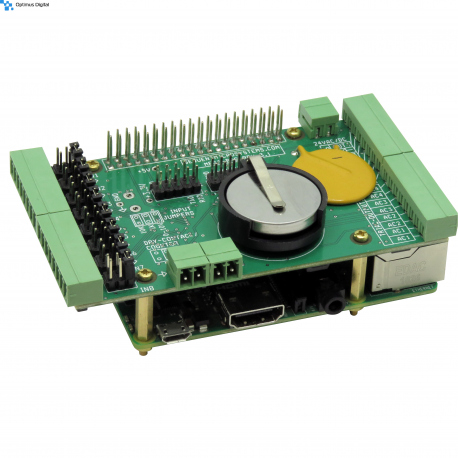 View larger
View larger
Sequent Microsystems Building Automation 8-Layer Stackable Card for Raspberry Pi
0104110000076748
New product
- Eight jumper selectable Universal Inputs
- 1K or 10K thermistors
- 0-10V analog inputs
- Dry contact/counter inputs
- Four AC Triac Outputs, 0.5A/500V
- Four 0-10V Outputs
- 24VAC Power Supply
- Four General Purpose LEDs
- RS485 In and Out ports
- Real Time Clock with Battery Backup
- Pluggable Connectors
- Hardware Watchdog
- Status LEDs on all Digital Inputs and Outputs
- TVS protection on all inputs
- On-board resettable fuse
- Eight Level Stackable
- Command line, Python drivers
- Node-Red code examples
See description for more details about the product.
Add to cart now!
This product is no longer in stock
- Write a review
- Remove this product from my favorite's list.
- Add this product to my list of favorites.
More info
Description
INEXPENSIVE, STACKABLE BUILDING AUTOMATION Card for Raspberry Pi
Brings to Raspberry Pi all IO’s needed for Building Automation Systems. Eight universal inputs can be jumper selected to process 0-10V signals, read 1K or 10K temperature sensors or dry contact counters. Four TRIAC outputs can drive loads up to 0.5A and 500V. Four 0-10V outputs can control light dimmers. Status LEDs display the state of all outputs. Keep time indefinitely even during power failure using the Real Time Clock with battery backup. Activate the hardware watchdog to monitor and power cycle the Raspberry Pi in case of software lockup. TVS diodes on all inputs protect the card for external ESD, and the on-board resettable fuse protects is from accidental shorts.
DRIVING ADDITIONAL LOADS
Heavy loads of up to 8A and 250VAC can be driven adding one or more 4-RELAY Cards. High DC loads of up to 10A and 250V, with fast response time and unlimited endurance can he driven by adding one or more 8-MOSFETS cards.
COMMUNICATION
Connect the card to other Industrial Automation systems using RS485/Modbus communication ports. The RS485 can be driver either from the local processor through I2C commands, or directly from the Raspberry Pi using the dedicated pins on the GPIO connector, which are routed on the Industrial board to the RS485 driver. In and out connectors simplify daisy-chain wiring to other devices.
COMPATIBILITY
The Building Automation Card share the I2C bus using only two of the Raspberry Pi’s GPIO pins to manage all eight cards. This feature leaves the remaining 24 GPIOs available for the user. The card is compatible with all Raspberry Pi versions from Zero to 4 and has all the necessary I/Os for your Building Automation projects.
POWER REQUIREMENTS
The Building Automation card requires a 24VAC/1A external transformer to operate and has to be powered from it’s own pluggable connector. The card supplies 5V and up to 3A to the Raspberry Pi on the GPIO bus. A local 3.3V regulator powers the rest of the circuitry.
PLUGGABLE CONNECTORS
All the IO’s are connected to heavy duty, 3.5mm pitch pluggable connectors which make field wiring very convenient for installation and debugging.
SOFTWARE INTERFACES
You can write your control system in C, C++, PERL , of the language of your choice using the Command Line system or Python Drivers. Or you can implement everything in Node-Red and display it in the browser using the Node-Red node.
FIELD CALIBRATION
All the analog inputs and outputs are calibrated at the factory, but firmware commands permit the user to re-calibrate the board, or to calibrate it to better precision. All inputs and outputs are calibrated in two points; select the two points as close to possible to the two ends of scale. To calibrate the inputs, the user must provide analog signals. (Example: to calibrate 0-10V inputs, the user must provide a 10V adjustable power supply). To calibrate the outputs, the user must issue a command to set the output to a desired value, measure the result and issue the calibration command to store the value.
STACKING MULTIPLE CARDS
Up to eight Building Automation cards can be stacked on your Raspberry Pi. Each card is identified by jumpers you install to indicate the level in the stack. Cards can be installed in any order. For your convenience, two stack jumpers and the eight input selection jumpers are provided with each card.
OPEN SOURCE HARDWARE
User’s Guide and Schematics of the Building Automation card can be downloaded from our website.
DIN-RAIL MOUNTING
Install your Raspberry Pi and up to eight Home Automation cards parallel to the DIN-Rail using our DIN-RAIL Kit Type-1. Install the whole assembly perpendicular to the DIN-Rail using the DIN-RAIL Kit Type-2.
WHAT’S IN YOUR KIT
Raspberry Pi Stackable Card for Building Automation
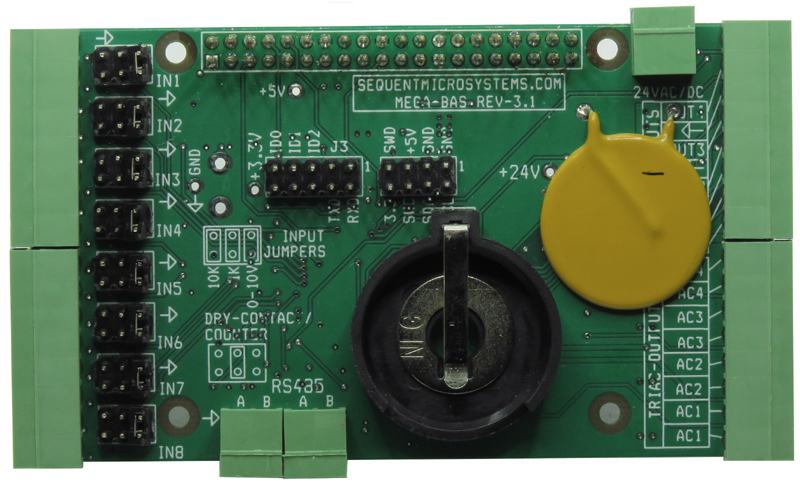
Mounting hardware
- Four M2.5x18mm male-female standoffs
- Four M2.5x5mm screws
- Four M2.5 nylon nuts

Eight jumpers for Universal Inputs selection

All connector plugs
- Four 8-pin female mating connector plugs for IO’s.
- Two 2-pin female mating connector plug for RS485 IN/OUT.
- One 2-pin female mating connector plug for power.
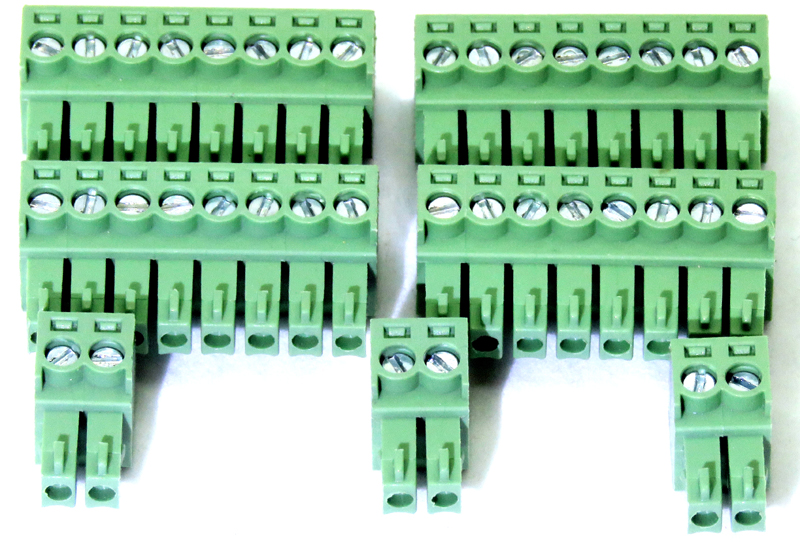
QUICK STARTUP GUIDE
1. Plug your MEGA-BAS card on top of your Raspberry Pi and power up the system.
2. Enable I2C communication on Raspberry Pi using raspi-config.
3. Install the MEGA-BAS software from github.com:
1. ~$ git clone https://github.com/SequentMicrosystems/megabas-rpi.git
2. ~$ cd /home/pi/megabas-rpi
3. ~/megabas-rpi$ sudo make install
4. ~/megabas-rpi$ megabas
The program will respond with a list of available commands.
| Specification | |
|---|---|
| Weight | 124 g |
| Dimensions | 10 x 7 x 2 cm |
| ANALOG INPUTS | 8 ea. 0-10V, 8 ea. 10K thermistor, 8 ea. 1K thermistor |
| ANALOG OUTPUTS | 4 ea. 0-10V |
| DIGITAL INPUTS | 8 ea. Dry Contact |
| DIGITAL OUTPUTS | 4 ea. 24VAC |
| POWER SUPPLY | 24VAC/1A |
Downloads
Don't delay. Buy today.
Add to cart now!
Reviews
Customers who bought this product also bought:
-

Sequent...
Eight MOSFETs with Status LEDs Pluggable...
194,71 lei
-
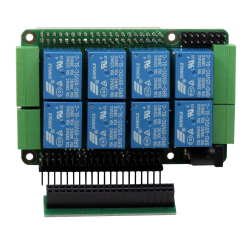
Sequent...
32-bit Processor running at 48MHz Eight relays...
243,39 lei
-
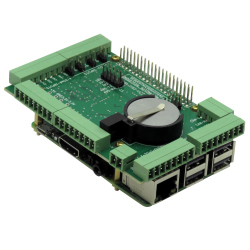
Sequent...
Four Optically Isolated Digital Inputs with...
438,10 lei







